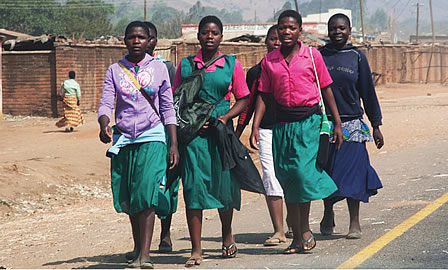The Health Policy Project ended in 2016. Work continued under Health Policy Plus (HP+) until 2022.
NEWS & VIEWS
Posted July 11, 2013
 |
A group of schoolgirls walk in Malawi.
|
LILONGWE, Malawi—The Malawi Ministry of Finance recently allocated 26 million Malawi kwacha (U.S.$80,000) for family planning commodities as part of its 2013/14 national budget, the first time that such an allocation has been made from domestic funds instead of donor aid. This decision represents an important governmental commitment to women’s health and to reducing the strain that high population growth puts on resources across all sectors, from education to the environment.
“We always talk of shortage of classrooms and drugs in hospitals,” says Paul Chibingu, chair of the Malawi Parliament’s Health and Population Committee. “Malawians must critically look at the number of children to have, because this has great impact on resources which the country has.” Malawi is one of the fastest-growing countries in Africa. Women have an average of almost six children each. At current growth rates, its population is projected to nearly triple to 38 million by 2040.
The newly created budget line item for contraceptive commodities is a direct result of continued advocacy for such funding by Members of Parliament (MPs) with support from the USAID-funded Health Policy Project (HPP) and its partner Partners in Population and Development Africa Regional Office (PPD ARO).
In August 2012, HPP conducted regional advocacy training in Uganda for women parliamentarians from four countries, strengthening their skills as champions for investing in family planning within their governments. During the workshop, parliamentary delegates from Malawi committed to establishing the first budget line item for FP. These commitments were reiterated at subsequent country monitoring meetings organized by HPP to follow up on progress made and encourage the parliamentarians to implement their commitments.
To meet these commitments, the women MPs built coalitions with chairpersons of various national committees, establishing a strong voice for family planning in Parliament. By April 2013, a new FP budget line had been created in the 2013/14 national budget, but the line item had not received any funding. Led by the delegates who had participated in the advocacy trainings, the MPs declared they would not support passage of the budget unless the new line had funding attached. News media covered the event, building momentum in support of a dedicated budget for family planning.
Several weeks later, the MPs held a follow-up meeting, which was opened by the chair of the Public Appointments Committee, who spoke boldly about investing in health and family planning. This was the first meeting of its kind in Malawi, with chairpersons of parliamentary committees meeting directly with senior Ministry of Health and Ministry of Finance officials to discuss the budgetary allocation for health.
The upshot? The Ministry of Finance allocated 26 million kwacha to the newly created budget line for FP commodities.
“The establishment of a funded budget line for FP commodities is an important step forward for women’s health and national development in Malawi,” said Olive Mtema, director of HPP in Malawi.
With an estimated 26 percent of married women ages 15-49 with unmet need for family planning, increasing provision and access to family planning and reproductive health services is key to achieving Malawi’s development goals.
Although pleased with the progress to date, the women MPs plan to continue to advocate for increased funding, pushing their partners in government until the budget is adequate to meet national family planning needs.
What's New
- Something to Build On: “Innovation Exchange” Celebrates the Health Policy Project’s Close and a New Beginning
- What Will it Take for Tanzania to Achieve ART Targets and Ensure Long-Term Sustainability of the HIV Response?
- Helping Kenya’s County Leaders Advocate for Increased Health Investments
- HPP Holds Working Meeting on Ensuring Responsible PEPFAR Transitions for Key Populations
- Health Policy Project Celebrates 2016 International Women's Day
- HPP Staff Participate in White House Conference on HIV Stigma Reduction

